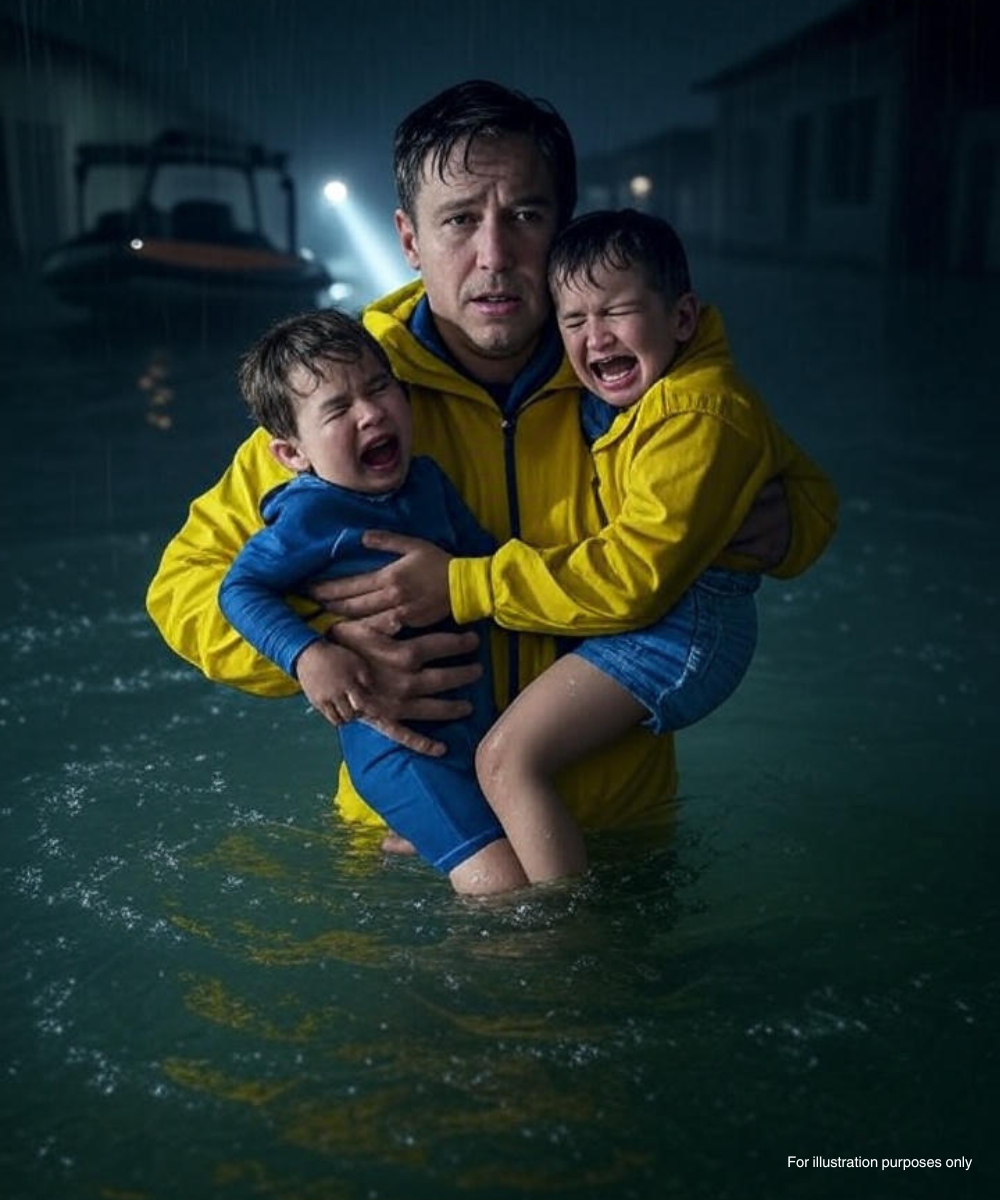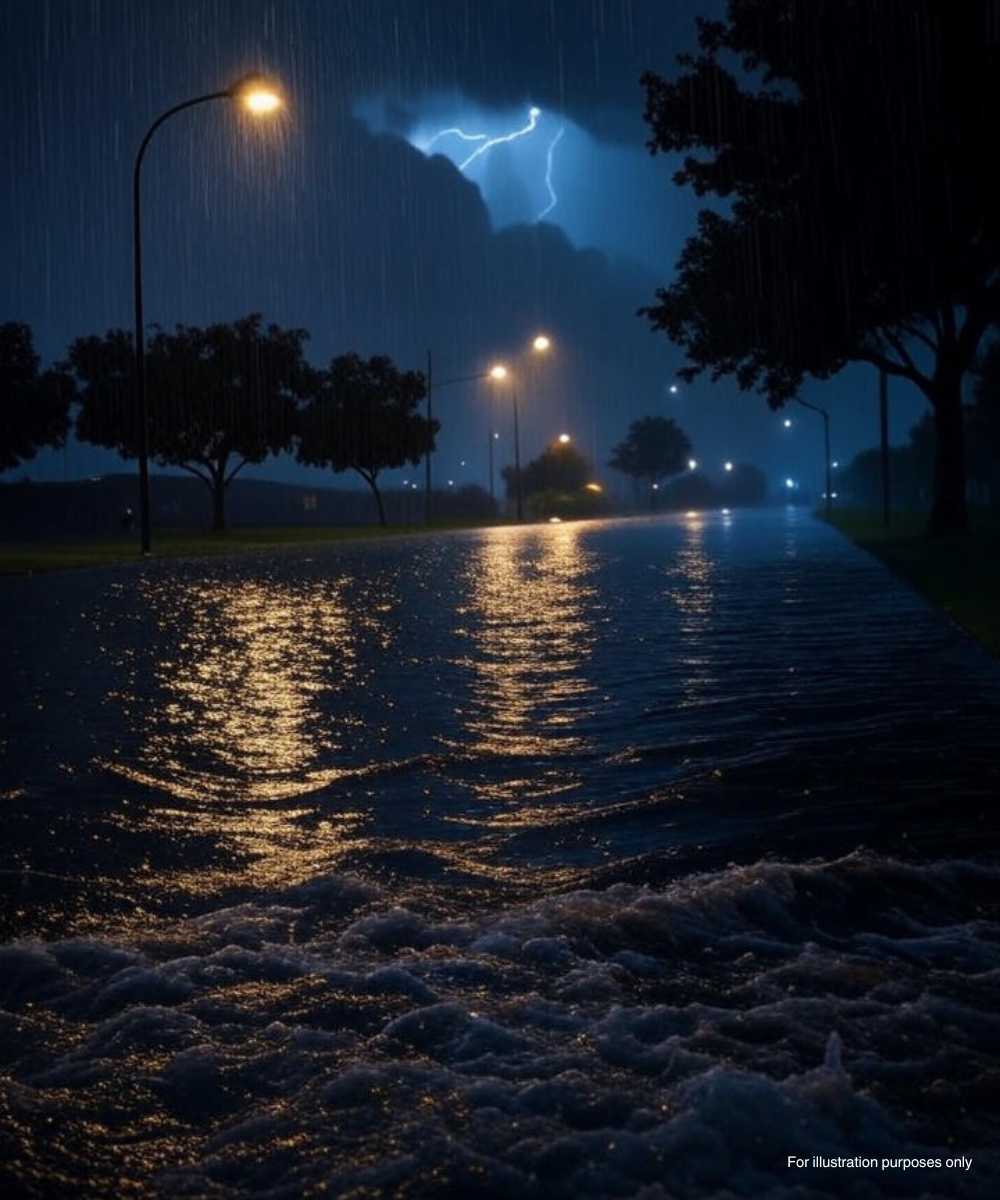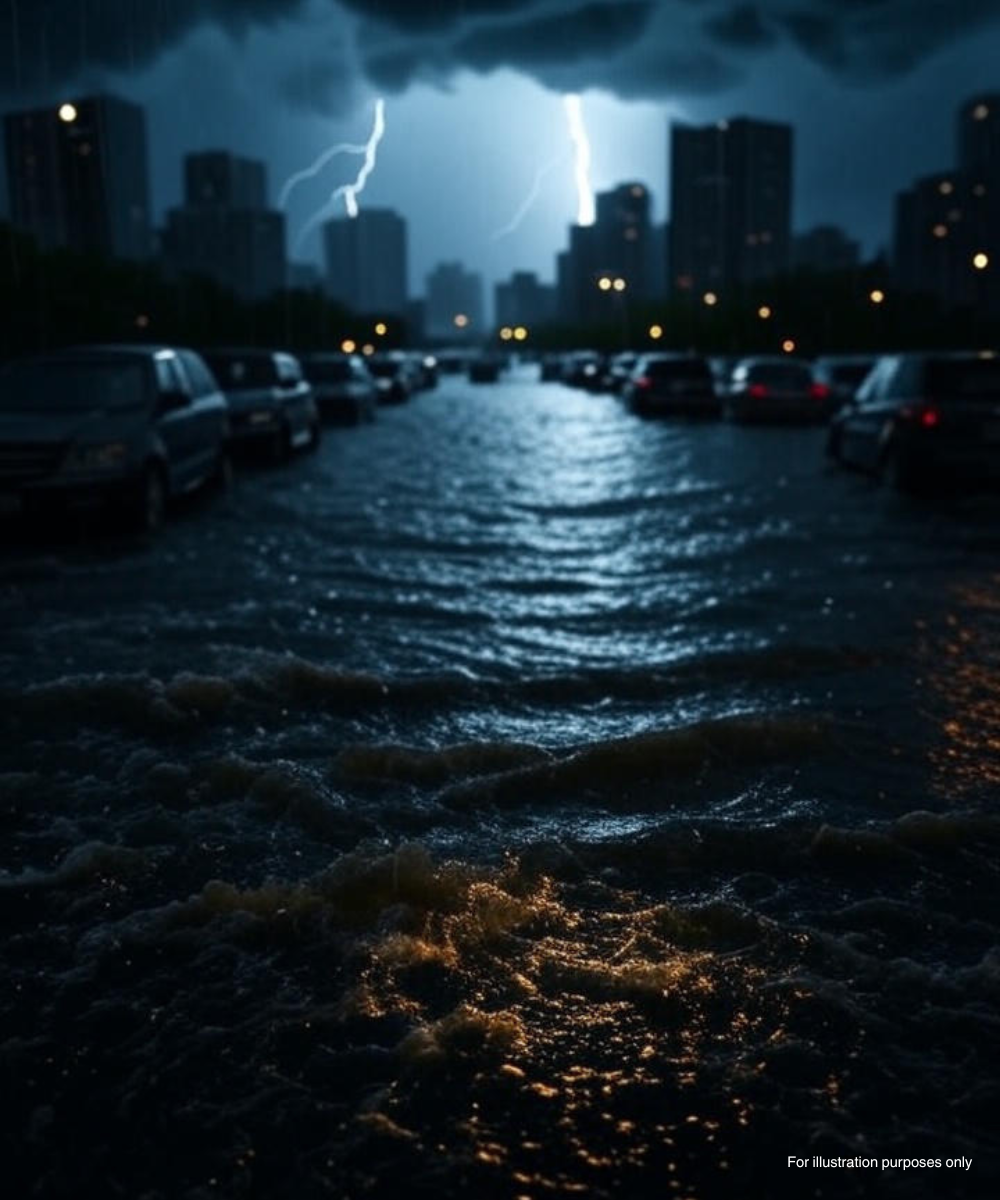It happened in a blur.
One moment I was washing dishes, humming softly as the kids played in the next room. The next, water crept across the tiles, swallowing the floor like a living thing. My breath caught. By the time I reached the living room, it was already knee-deep and rising.
The power went out with a crack. The lights flickered once, then died.
I tried the door—it wouldn’t budge. Swollen from the pressure. Sealed by the water.
Panic surged.
I grabbed Liam and Nora, hauled them up the stairs. My phone was useless—dead from the storm or soaked in panic, I couldn’t tell. We were trapped. The flood had climbed too fast, too silently. I pressed them close in the dark, pretending calm while shaking like a leaf in a storm.
Then, a knock.
No—a pounding, at the window. And a flash of light cutting through the murk. A man outside, waist-deep in water, a beam from his flashlight slicing the night.
A man in a bright yellow jacket.
“I’ve got you!” he shouted. “Pass them through—now!”
I didn’t hesitate. Didn’t ask who he was. I handed over my babies, one after the other, watching as he balanced them effortlessly against his chest, shielding their faces from the rain with his own body.
I stumbled down after them, barefoot and breathless, but by the time I reached the street, a rescue boat was gliding past.
He handed the kids in carefully. Then turned.
“Wait!” I called out. “Who are you?”
He hesitated only a moment.
“Tell them someone was looking out for them today.”
And with that, he turned back into the dark, toward the abandoned house next door.
Just like that—gone.

The crew helped me into the boat. I sat shaking, soaked to the bone, clutching my kids. All I could think of was the man who vanished before I could say thank you.
At the evacuation shelter, I asked around. Described him. Tall, calm, yellow jacket. No one recognized him. One elderly volunteer blinked behind thick glasses.
“That sounds like the guy who rescued the Reynolds’ dog from the roof,” she said slowly. “But they don’t know who he is either.”
A phantom in a flood.
When we were finally allowed back, our street looked like it had been dragged through the underworld. Debris hung from trees. Mud smeared every surface. My house, though standing, bore the look of something wounded.
I carried Nora while Liam held my hand like he’d never let go. The smell hit first—mildew, sewage, grief. We climbed the stairs to grab what we could: photos, medicines, a few clothes that hadn’t been soaked.
On the way out, I froze.
Footprints.
Large, muddy ones—leading up the steps to the shattered window. They stopped right at the sill.
He’d never asked to come in. Never broken the glass.
Just appeared. And disappeared.
That night, as my children slept on borrowed cots, I sat awake and stared at nothing. I kept thinking—what if he hadn’t come?
Two days later, we moved in with my sister. Life pressed on. The kids adapted. I didn’t.
I started walking the neighborhood after dark, asking questions door-to-door.
“I’m not here to bother anyone,” I’d say. “I just want to thank him.”
One night, a quiet neighbor—Mr. Henley—paused when I described the rescue.
“You said he walked toward the house next door?”
I nodded.
“That place has been empty since last year. Fire took most of it. Belonged to a firefighter, I think. Mark, his name was. Sold it after his wife passed.”
I blinked. “So no one’s living there?”

He shook his head. “Not that I know of. But… maybe someone came back. People return to wreckage more often than you’d think.”
The next morning, I walked to the ruined house. It looked worse in daylight—blackened porch, boarded windows, the kind of quiet that watches you.
I knocked anyway.
No answer.
As I turned to go, something caught my eye: a crayon drawing taped to the mailbox.
Two stick-figure kids and a tall man in a yellow coat. Underneath:
“THANK YOU — From Liam & Nora”
Tears burned behind my eyes. I hadn’t seen them draw it. They must’ve done it while I slept.
I left my own note under theirs:
“You saved us. If you ever need anything—knock.”
He never did.
Weeks passed. Then months. No sign of him.
Until one spring night when Nora spiked a fever that wouldn’t break. Her tiny chest wheezed with every breath. I rushed her to the ER, heart in my throat.
We waited for hours. Nurses moved in slow motion. Machines beeped like heartbeats too far away.
Then, past midnight, a nurse approached. “There’s a man in the lobby. He’s asking about Nora.”
I stood, stunned. “Who is he?”
She shrugged. “Didn’t say. Just wanted to know if she was okay. Said he didn’t want to come in.”
I ran to the front—but the lobby was empty.
The receptionist handed me an envelope.
Inside:
“She’ll be okay. She’s strong—like her mom.”
And taped to the bottom:
A small plastic firefighter badge.
My hands shook. It all clicked.

Not just a passerby. Not a drifter.
A firefighter.
Maybe one who couldn’t save someone once—and decided never to let that happen again. Not if he could help it.
I never found him again.
But sometimes, I still see signs.
A rake leaning against the porch after a windstorm.
A sealed box of groceries when I’m sick.
A flower tucked under the hydrant two blocks down.
Some stories don’t need a name.
Some angels don’t need wings.
And sometimes, the bravest souls walk into the water without waiting for applause—because saving you is thanks enough.
